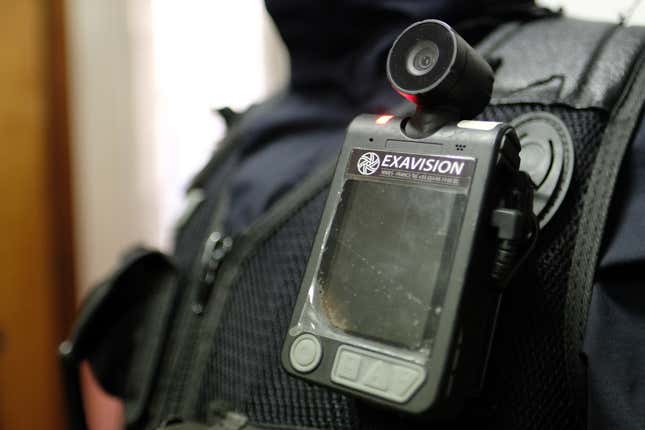
The three Louisville Metro police officers who raided the home of 26-year-old EMT Breonna Taylor weren’t wearing body cameras at the time of the shooting, raising questions about the department’s policies as local and state officials called for the FBI to review the high-profile killing.
Three officers were responsible for serving a warrant at Taylor’s house on March 13: Sergeant Jon Mattingly, who was shot and injured during the incident; Detective Myles Cosgrove, and Detective Brett Hankison, reports WAVE 3 News. According to the LMPD, all three cops are part of the Criminal Interdiction Division, a relatively new team comprising several units of officers that work mainly on narcotics and violent crime cases.
LMPD Major Paul Humphrey told the local news station that these officers are generally not issued body cameras “due to the desire to protect some of the people that they interact with and to protect their investigation.”
But as attorney Leland Hulbert told WAVE 3, the officers weren’t gathering information the night they arrived at Taylor’s home, they were serving a warrant—and the lack of body cameras makes it nearly impossible to know what actually happened that night.
“We would’ve known whose story was right, because in these barge-in type cases, the police always say they did everything right,” Hulbert said. “The victims say they didn’t do anything right. The police are all wrong. A body cam would take care of about 75-80 percent of that and clear up a lot of things.”
River City Fraternal Order of Police President Ryan Nichols told the TV station the case might lead LMPD to review its body camera protocols so narcotics officers wear cameras more often.
“When they’re putting on their raid vest that says police, their tactical vest, whatever they’re doing to prepare for that warrant prior to the execution,” Nichols said. “They could possibly wear a body camera during the execution of that warrant.”
While body camera footage isn’t a panacea for police brutality cases—far from it, in fact—such video could resolve one key dispute between Taylor’s family and the LMPD: whether officers announced their presence before they took a battering ram through Taylor’s apartment door.
The three cops attained a “no knock” warrant, which doesn’t legally require them to announce their presence when serving the document. But officers said they did, as well as knocking “multiple times” on Taylor’s door.
Taylor’s neighbors, as well as her boyfriend, Kenneth Walker, who was in the home with Taylor at the time, dispute this claim. Walker, who shot and injured one of the police officers, said he thought intruders were breaking into Taylor’s apartment and fired at them in self-defense.
As Walker’s attorney told the Louisville Courier-Journal, the front door “suddenly explode[d],” with gunshots following. Walker, a licensed gun owner, shot back at the officers as they were entering the apartment, Taylor family attorney Ben Crump said.
“Don’t African Americans have the right to the Second Amendment?” Crump recently asked. “He was trying to protect Breonna. He was trying to protect himself.”
Had the officers been wearing body cameras, investigators could know more about the cops’ conduct that night, and whether a self-defense argument is plausible.
The only footage and photos available were taken in the aftermath of the raid, and show the damage down to Taylor’s house, as well as the harrowing moments when officers called for Walker to step out from the apartment.
Walker has been charged with attempted murder. Attorneys for both the Walker and Taylor families, along with advocates and activists, have called for police to drop the charges. The past few days have seen a surge in a GoFundMe intended to pay for Walker’s legal fees, reports the Courier-Journal.

